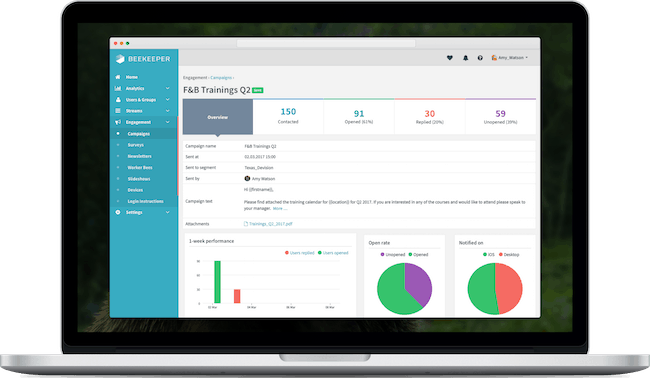Digital workplace trends indicate that incorporating a bit of automation simplifies operations workflows and internal communications. Using internal communications tools, like an employee intranet portal or digital workplace technology, can go a long way in improving communications and productivity for your workforce. In fact, using social media to improve workforce communications could increase productivity by up to 25%.
Using social media isn’t the only secret of companies with amazing internal communications, however. Here are three types of internal communications you need to automate to enhance your digital workplace and boost operations.
1. Pulse Surveys for Real-Time Employee Feedback
An essential component of a good internal communications program is consistently measuring the effectiveness of the program. One of the easiest ways to do this is by asking your workforce to complete pulse surveys using internal communications tools. Doing so allows you to get the real-time employee feedback and data you need to make any suggested or necessary changes. This is one of the most useful examples of common workforce communications that can be automated very easily within your digital workplace.
Wondering where to start? There are a variety of internal communications tools for conducting employee feedback surveys available. First, the employee feedback survey itself needs to be created. Make sure that it’s anonymous to get authentic and honest feedback. It’s important in this phase of the process to fine-tune specific questions tailored to get the information you need most. Then the distribution of the survey can be automatically distributed to a pre-determined list of employees. You can even automate reminders to be sent to employees who have not taken the survey.
Once the survey is over, you’ll receive all kinds of valuable data to inform how to improve workforce communications for your digital workplace. At this stage, it’s imperative to be sure you actually act on the employee feedback survey results. An HBR.com study showed that 52% of upper management reviewed surveys but took no action. Automating this process doesn’t do any good if the results aren’t put to good use.
2. Automated Digital Operations
Automating many of the most common digital workplace operations, such as re-occurring newsletters or shift notifications, is another method of incorporating internal communications trends. Set up a template and mailing list one time, and going forward new content can be easily customized and added in. All of the important details and formatting will be retained, making it quick and easy to update. You can even create multiple templates designed for different target groups—for example a company-wide template, or additional ones tailored to different departments.
Newsletters can be a great way to communicate with many employees at once. Not only can you communicate vital information, you can also make employees feel like they belong to your company and that they are an important part of the process. Good newsletters are another strategy of companies with great internal communications, as they “can be effective in strengthening the company messaging and creating a sense of family among employees,” according to Mario Almonte, a partner at a Manhattan-based public relations company.
3. Trigger-based Push Notifications for Unified Communications During Crisis
At some point you will need to notify employees of something like:
- Mandatory trainings
- Emergency situations and procedures
- Policy notifications
Whatever the case, automating these processes can save lots of time and money for your business while providing a consistent, easily accessible form of workforce communications for your digital workplace.
A surprising number of companies still rely on internal communications tools like phone trees, but those are an increasingly ineffective way to deploy workforce communications. Why? Studies have shown that 82% of employees would prefer to receive a text message instead of a voicemail — and a whopping 32% delete voicemails without ever reading them! If using the phone is your company’s primary operations and internal communications method of notifying employees, it’s time to choose a new way.
Don’t be afraid to adopt automated communication trends as a part of your digital workplace. It may require a bit of time and money to set-up, but once it’s done it will save even more of both! Your internal communications team — and your employees — will thank you for it.
To learn more about how to improve operations with a digital internal communications tool, get a free demo of Beekeeper.
Most Frequently Asked Questions
Internal communication refers to a group of processes or tools used for effective communications among participants within a company.






